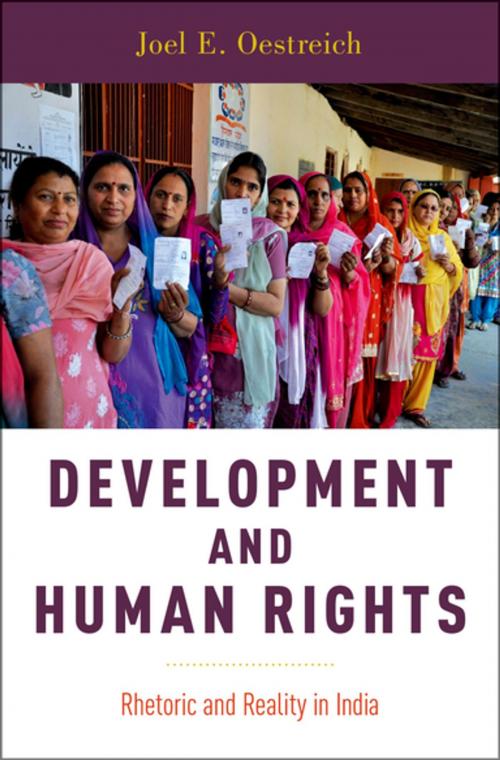Development and Human Rights
Rhetoric and Reality in India
Nonfiction, Social & Cultural Studies, Political Science, International| Author: | Joel E. Oestreich | ISBN: | 9780190637361 |
| Publisher: | Oxford University Press | Publication: | April 3, 2017 |
| Imprint: | Oxford University Press | Language: | English |
| Author: | Joel E. Oestreich |
| ISBN: | 9780190637361 |
| Publisher: | Oxford University Press |
| Publication: | April 3, 2017 |
| Imprint: | Oxford University Press |
| Language: | English |
In 2003, the United Nations adopted a common rights-based approach to development in their efforts to promote an international standard of human rights throughout the world. The approach emphasizes economic, social, and cultural rights, but plays down the role of civil and political rights in development. Intergovernmental and non-governmental agencies operate only at the invitation and sufferance of their hosts, and states retain full sovereignty and control over their territory; and the direct promotion of civil and political rights by foreign organizations has seemed beyond the ability of multilateral development agencies. But as Development and Human Rights shows, UN agencies have begun to take on a remarkable set of development priorities that, while carefully circumscribed and defined, constitute greater involvement in a state's internal affairs than anyone would have considered in the past. In this book, Joel E. Oestreich presents the first full-length study of how international agencies evaluate the rights situation in a single country, and the first study to look at both the good and the bad in a rights-based approach. It looks particularly at the human rights challenges faced in India, considering the work of five UN agencies: UNICEF, the UN Development Programme, the World Bank, the UN Fund for Population Activities, and UN Women. Over the course of the book, Oestreich summarizes how the UN navigates this difficult political terrain, and how effectively these policies are being implemented. Development and Human Rights ultimately considers how rights-based approaches fit in the traditional discourse on human rights, and the ability of these agencies to initiate meaningful change on state behavior in the rights arena.
In 2003, the United Nations adopted a common rights-based approach to development in their efforts to promote an international standard of human rights throughout the world. The approach emphasizes economic, social, and cultural rights, but plays down the role of civil and political rights in development. Intergovernmental and non-governmental agencies operate only at the invitation and sufferance of their hosts, and states retain full sovereignty and control over their territory; and the direct promotion of civil and political rights by foreign organizations has seemed beyond the ability of multilateral development agencies. But as Development and Human Rights shows, UN agencies have begun to take on a remarkable set of development priorities that, while carefully circumscribed and defined, constitute greater involvement in a state's internal affairs than anyone would have considered in the past. In this book, Joel E. Oestreich presents the first full-length study of how international agencies evaluate the rights situation in a single country, and the first study to look at both the good and the bad in a rights-based approach. It looks particularly at the human rights challenges faced in India, considering the work of five UN agencies: UNICEF, the UN Development Programme, the World Bank, the UN Fund for Population Activities, and UN Women. Over the course of the book, Oestreich summarizes how the UN navigates this difficult political terrain, and how effectively these policies are being implemented. Development and Human Rights ultimately considers how rights-based approaches fit in the traditional discourse on human rights, and the ability of these agencies to initiate meaningful change on state behavior in the rights arena.















